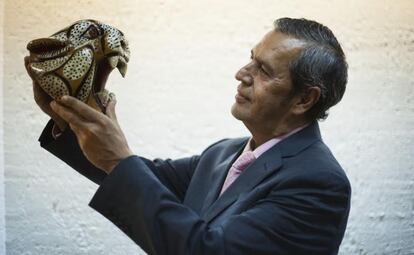“If Guerrero scares people abroad, imagine what we go through here”
The interim governor of Mexico’s most violent state was once jailed and tortured


Rogelio Ortega Martínez doesn’t like sleeping with the light on – it terrifies him.
For the interim governor of Mexico’s violent Guerrero state, it’s a reminder of a time when he was known as El Tigre, and he was a young university professor following in the footsteps of Lucas Cabañas, the legendary guerrilla who came out of the Ayotzinapa rural teaching school. It was a violent period.
Then-Mexican President José López Portillo ordered a nationwide hunt for leftist revolutionaries. Leaders such as El Tigre had their days numbered, and one by one they fell.
Ortega’s time came one night as he left his home and was cornered on the street by two vehicles. His kidnappers placed a hood over his head and dragged him to a small cell in which he could barely fit.
While his family reported the kidnapping, Ortega was brutally tortured day and night by a variety of different methods, under an electric light that was never switched off.
For the past 10 years, organized crime has infiltrated the institutions”
Mayor Arturo Acosta, the architect of the dirty war against the leftists, came to his cell. “We are going to let you go,” he told him. “They’re making a lot of noise out there, but you don’t fool me. You are a member of the guerrillas.”
Blindfolded, he was taken to the so-called Devil’s Front, a ditch into which opposition members had been thrown, where he was released. He had been held captive for 28 days.
Ortega had never before told the story to a journalist in such detail. It all came back to him when a photographer asked him to hold up a porcelain tiger head, which immediately prompted the flashback.
A lot has changed in the 38 years since the incident. Acosta was promoted to general, convicted of drug trafficking, and was later killed by three gunshots to the head.
Ortega, who was once a prisoner, took over as interim governor of Guerrero state after his predecessor stepped down last October following the massacre of 43 teaching students in Iguala the previous month.
After this summer’s elections, Ortega hopes to return to his teaching post at the university.
Question. Are you aware that Guerrero ignites a lot of fear among people abroad?
Answer. If a lot of people abroad are scared, you can imagine what the people here go through each day.
Q. Do you feel threatened?
A. Everyone has to deal with their own realities and those who don’t like it have the option to leave. There are six million of us, but only three million live in Guerrero. The rest have left in search of better opportunities. They didn’t go to Yale or Harvard but took hard labor jobs. And that is what is needed in Guerrero: work.
Q. Guerrero is the largest producer of opium in Mexico; it has the highest homicide rate; and it is one of the country’s poorest areas. How can you govern a state like this?
A. If poppies are grown, it is because someone is buying the product. And if someone is buying, it is because there is greater market demand for it than for the traditional products in Guerrero, such as corn or avocados.
Q. What can be done to stop all of this?
A. You have to pay agricultural workers better than drug traffickers pay. Look, poppies are harvested twice a year, and in the last quarter alone around 50,000 fields were destroyed. “Those poor workers,” was my reaction. Why? Because drug traffickers pay them in advance for their harvest. How can they return that money if their fields are burned? They have to give up their children. Traffickers take their children to train them to become hitmen; they are trained to kill without thinking twice.
Q. How far has the drug trade infiltrated power?
A. This isn’t a phenomena restricted to Guerrero. For the past 10 years, organized crime has infiltrated the institutions. And I am not just taking about bureaucracy, judges and prosecutors, I am talking about the political parties. The parties opened the door to financing candidates. Later, the traffickers realized that they could also become mayors, deputies and including governors.
There are incidents that can never be erased from history. Ayotzinapa is one of those events”
Q. How come the Iguala massacre wasn’t kept a secret?
A. Because the drug traffickers got mixed up with the Ayotzinapa rural teaching school, which is a collective that has a tradition of struggle. That crime was not going to go unpunished or be kept quiet. Now people in Iguala come up to me and tell me that their children have been taken from them – these are people who had never said anything before but who are no longer scared.
Q. Do you think the Iguala case is closed?
A. How can you close that episode? You tell every father and mother that their son has disappeared, they will turn over every rock to find them. And if you tell them that their child is dead, the first thing they will say is that they don’t believe you. We even have our doubts when we see a loved one in a coffin. Life will continue only when the authorities are capable of providing evidence, like they did with Alexander Mora [the only victim to be positively identified through DNA testing].
Q. ¿Do you think Mexico can survive Iguala?
A. There are incidents, such as the night of Tlatelolco, that can never be erased from history. Ayotzinapa is one of those events – it changed Mexico.
Tu suscripción se está usando en otro dispositivo
¿Quieres añadir otro usuario a tu suscripción?
Si continúas leyendo en este dispositivo, no se podrá leer en el otro.
FlechaTu suscripción se está usando en otro dispositivo y solo puedes acceder a EL PAÍS desde un dispositivo a la vez.
Si quieres compartir tu cuenta, cambia tu suscripción a la modalidad Premium, así podrás añadir otro usuario. Cada uno accederá con su propia cuenta de email, lo que os permitirá personalizar vuestra experiencia en EL PAÍS.
En el caso de no saber quién está usando tu cuenta, te recomendamos cambiar tu contraseña aquí.
Si decides continuar compartiendo tu cuenta, este mensaje se mostrará en tu dispositivo y en el de la otra persona que está usando tu cuenta de forma indefinida, afectando a tu experiencia de lectura. Puedes consultar aquí los términos y condiciones de la suscripción digital.








































